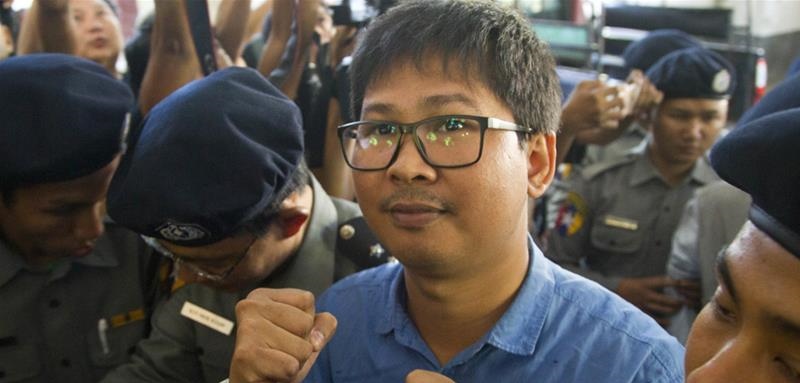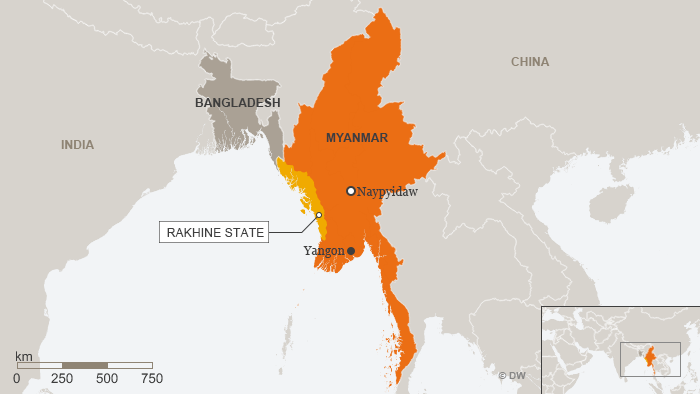U.N. chief urges Myanmar government to free journalists
September 22, 2018 | Expert Insights

UN Secretary General has called for Suu Kyi-led government to free reporters from Reuters who were arrested for reporting in the Rakhine state.
Background
The Rohingya are an ethnic Muslim minority group from Myanmar’s western Rakhine state. Their origin can be traced back to the 15th century when thousands settled in Myanmar from the Arakan Kingdom. Practicing a variation of Sunni Islam, there is reportedly one million Rohingya in Myanmar. The government of Myanmar has, however, refused to recognize them as one of its ethnic groups. They do not get legal protection from the government. The processes for them to get a citizenship is incredibly hard and often impossible.
A fresh bout of violence erupted in Myanmar on August 25th, 2017 and over 620,000 Rohingya Muslims fled the region as a direct result. Those who fled the region under dangerous circumstances have since claimed that the nation’s armed forces were involved in activities such as burning homes and attacking women and children. The government and the military of Myanmar have denied such claims.
The international community has expressed its concern over the plight of the Rohingya Muslims and the escalating violence. For the first time in eight years, the UN held its first public meeting on the situation. UN Secretary-General Antonio Guterres said that the violence in the region has "spiraled into the world's fastest-developing refugee emergency, a humanitarian and human rights nightmare." He added, “We've received bone-chilling accounts from those who fled, mainly women, children and the elderly.”
Some 700,000 Rohingya crossed from Myanmar into Bangladesh fleeing the crackdown, which U.N.-mandated investigators said last month was launched by senior Myanmar generals with “genocidal intent.

Analysis
U.N. Secretary-General Antonio Guterres on Thursday called on the Myanmar government to pardon and release two imprisoned Reuters journalists as soon as possible.
“I hope that the government will be able to provide a pardon to release them as quickly as possible,” Guterres told reporters at the United Nations in response to a question about Aung San Suu Kyi’s recent remarks on the case.
Reuters reporters Wa Lone, 32, and Kyaw Soe Oo, 28, were convicted on Sept. 3 under the colonial-era Official Secrets Act in a case that was seen as a test of democratic freedoms in Myanmar.
The reporters, who pleaded not guilty, said they were handed rolled papers by police shortly before they were detained last December, and a police witness testified in court that they had been set up.
The reporters had been investigating the killing of 10 Rohingya Muslim men and boys by security forces and local Buddhists amid a military response to insurgent attacks last August.
Myanmar’s de facto leader Aung San Suu Kyi last week said that the two journalists were not convicted because of their work but because they broke the law. The court has announced that they have violated the Official Secrets Act, which is a punishable offence under Burmese law.
The Reuters reporters had denied the charges, insisting they were set up while exposing the extrajudicial killing of 10 Rohingya Muslims in the village of Inn Din in September last year.
The case has sparked an international outcry and is seen as an attempt to muzzle reporting on last year’s crackdown by Myanmar’s security forces on the Muslim Rohingya minority in Rakhine state.
UN rights chief Michelle Bachelet has said the jailing of the pair “sends a message to all journalists in Myanmar that they cannot operate fearlessly, but must rather make a choice to either self-censor or risk prosecution.”
Earlier on Thursday, the British foreign minister, Jeremy Hunt, said on a visit to Myanmar that he was “extremely concerned” about the case of two Reuters journalists. He said he raised specific concerns with Suu Kyi about the conviction and asked her to consider giving them a pardon.
Counterpoint
There is a possibility that the reporters detained have genuinely violated Burmese law. The Official Secrets Act protects the government from any intelligence leaks and usually deals with threats to national security. The violation of this act itself results in punishment, as the court observed and declared a judgement.
The cacophony in Myanmar extends beyond the borders of the Rakhine state, as there is no public accountability. Contradictory reports emerge from the capital about whether this genocide was state-sanctioned or not. Therefore, it is extremely difficult to pin the blame on any one faction or independent actor right now.
Assessment
We believe that the current Rohingya crisis is one of the most severe humanitarian crises that South Asia has faced in recent times. The general response of the Burmese state has been extremely callous and one of constant denial. We feel that the solution to the present crisis lies within the country. The Burmese government must be cajoled by the UN and other global leaders to find an amicable solution for the Rohingyas to return.








Comments